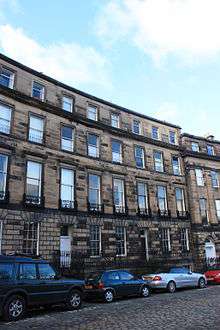Duncan Farquharson Gregory
| Duncan F. Gregory | |
|---|---|
 | |
| Native name | Duncan Farquharson Gregory |
| Born |
13 April 1813 Aberdeen, Scotland |
| Died |
February 23, 1844 (aged 30) Canaan Lodge, Edinburgh |
| Academic background | |
| School or tradition | Trinity College, Cambridge |
| Academic work | |
| Main interests | Mathematician |
| Notable works | The Mathematical Writings of D. F. Gregory, M.A. |
| Notable ideas | Examples of the Processes of the Differential and Integral Calculus |
| Influenced | George Boole |


Duncan Farquharson Gregory (13 April 1813 – 23 February 1844), a Scottish mathematician, was the youngest son of James Gregory (1753–1821) and Isabella Macleod (1772–1847).
Education
He was born in Aberdeen and originally taught by his mother. In October 1825 he was sent to the Edinburgh Academy, and after two years of study spent a winter at a private academy in Geneva. While there his mathematical talent attracted attention, specifically geometry. On his return to Scotland, he attended classes at the Edinburgh University, working at chemistry, making experiments in polarised light, and advancing in the higher parts of mathematics, guided by Professor Wallace, his mentor. In October 1833 he commenced residence at Trinity College, Cambridge. He earned fifth wrangler in the tripos of 1837. He took the degrees of B.A. in 1838 and M.A. in 1841.[1] He was elected fellow of Trinity College in October 1840.[2]
Mathematics
Initially recognized for his essay The Foundations of Algebra presented to the Royal Society of Edinburgh in 1838. Upon completing his degrees, he served as Moderator in 1842, examiner through May 1843 and was also appointed assistant tutor.[3] At the suggestion of his friend, Archibald Smith, he founded and was the first editor of the Cambridge Mathematical Journal in November 1837, helped by Robert Leslie Ellis who succeeded him as editor.[4][5] Many of his articles for the CMJ were collected in The Mathematical Writings of D. F. Gregory, edited by his friend and colleague William Walton. In 1841 he published his Examples of the Processes of the Differential and Integral Calculus, which expanded the earlier work of John Herschel, George Peacock and Charles Babbage to include the mathematics used to describe discontinuities observed in heat transfer explored by the French mathematician Joseph Fourier, and the theory of undulatory light, a topic familiar to him.[6] He was elected a member of the Philological Society 12 May 1843.[7]
Other Disciplines
Acting as tutor, Duncan Gregory was also an examiner of his college and lectured occasionally in chemistry. Two of his papers explored the physics of pendulums (clockmakers) and were written with Mr. Archibald Smith.[8] (On the Sympathy of Pendulums, See pp. 175–86, Mathematical Writings of D.F. Gregory.)
Illness and Death
His circumstances did not allow him to accept the Mathematical Chair at the University of Toronto offered in 1841. Illness overtook him the next year. Incapacitated, he left Cambridge in the spring of 1843, and died in Edinburgh the following February, at 30 years of age.[9]
He is buried with his siblings in his parents burial plot in the south-west corner of Canongate Churchyard, next to Adam Smith.
Family
Duncan Farquharson Gregory never married. He was the youngest son of eleven children. His older brother William, like his father, was a chemist and physician. His great-great-grandfather James Gregory, the mathematician, designed the Gregorian telescope. James's nephew, David Gregory, was appointed a professor of mathematics at the University of Edinburgh in 1683.
Duncan lived together with his brothers and their wives in a huge Georgian townhouse, 10 Ainslie Place, on the Moray Estate in the western New Town of Edinburgh, originally their father's house.[10]
Published Works
- Presentations made to the Cambridge Philosophical Society.[11]
- 'On the real nature of symbolical algebra' - 14 May 1838.
- 'On the logarithms of negative quantities' - 26 November 1838.
- 'On photogenic drawings' - 22 April 1839
- 'On chemical classification' - 6 May 1839
- The Mathematical Writings of D. F. Gregory, M.A., Ed. W. Walton, (Cambridge, 1865).
Notes
- ↑ Graduati Cantabrigienses, p. 133, 1846. "Gregory, Duncan Farquharson (GRGY833DF)". A Cambridge Alumni Database. University of Cambridge.
- ↑ The Mathematical and Other Writings of R.L. Ellis, ed. by W. Walton, pp. 194-8, (Cambridge, 1863).
- ↑ The Cambridge University calendar, Volumes 1909-1910, pp. 117-18. (Cambridge, 1870).
- ↑ Proceedings of the Royal Society of Edinburgh, by Sir Robert Christison, pp. 284-5, (Edinburgh, 1875).
- ↑ The London, Edinburgh, and Dublin Philosophical Magazine and Journal of Science Vol. XXVII Jan.-Jun. 1864, p. 140, (London University, 1864).
- ↑ Mathematical Writings of Ellis, pp. 198-9.
- ↑ Proceedings - Philological Society (Great Britain), Volume 1, No. 9, (London, 1844).
- ↑ Philosophical Magazine Vol. XXXI Jan.-Jun. 1866, p. 77, (London University, 1866).
- ↑ Mathematical Writings of Ellis, p. 200.
- ↑ http://digital.nls.uk/directories/browse/pageturner.cfm?id=83400519&mode=transcription
- ↑ Proceedings C.P.S., The Foundation and Early years of the Society by John Willis Clark, delivered 27 October 1890, pp. xliii. xliv. (Cambridge, 1892).
References
| Wikisource has the text of a 1911 Encyclopædia Britannica article about Duncan Farquharson Gregory. |
| Wikiquote has quotations related to: Duncan Farquharson Gregory |
-
 "Gregory, Duncan Farquharson". Dictionary of National Biography. London: Smith, Elder & Co. 1885–1900.
"Gregory, Duncan Farquharson". Dictionary of National Biography. London: Smith, Elder & Co. 1885–1900. - Proceedings of the Cambridge Philosophical Society, vol. vii. October 28, 1889 - May 30, 1892, (Cambridge, 1892).
-
 Chisholm, Hugh, ed. (1911). "Gregory_(family)". Encyclopædia Britannica (11th ed.). Cambridge University Press.
Chisholm, Hugh, ed. (1911). "Gregory_(family)". Encyclopædia Britannica (11th ed.). Cambridge University Press.